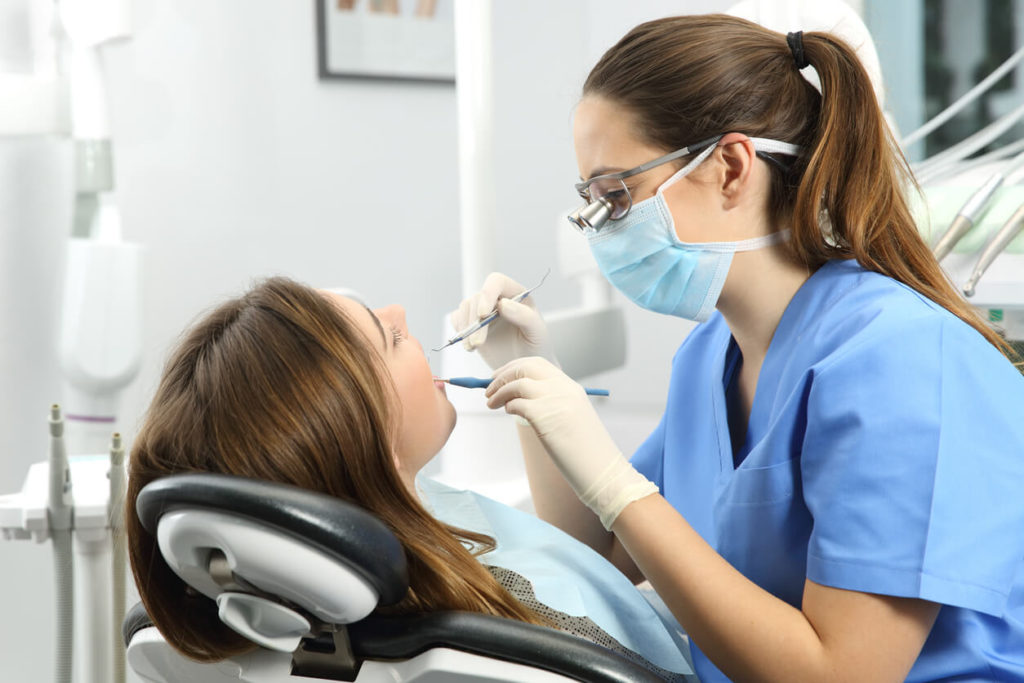Taking care of your oral health is a simple matter that mainly requires brushing your teeth twice a day and flossing.

However, your dentist also plays an essential role in your oral health. He can improve your oral health through different procedures that provide better results than the one your toothbrush is capable of.
Dental cleaning may be the only thing missing for you to achieve the oral health you are looking for, and your dentist is ready to help you with it.
We will explain in this article what dental cleaning is and how it can help you improve your health.
What is dental cleaning?
Dental cleaning is a simple yet effective procedure performed at the dentist's office that consists in cleaning your teeth deeply.
When you brush your teeth at home with a toothbrush, you remove food leftovers and plaque. But, the purpose of a dental cleaning is to remove and eliminate calculus, commonly referred to as tartar, to heal gums affected by gum disease and prevent cavities.
This procedure is done using a tool called a scaler. Furthermore, the scaler can be manual, which uses its sharp edges to separate calculus from the teeth, or ultrasonic, vibrating at high speed to break and eliminate calculus.
Calculus and its effect on oral health
The human mouth is covered in bacteria, saliva, and other elements. And all these elements naturally mix over your teeth and restoration surfaces to form a biofilm, commonly known as plaque.
This is the sticky and transparent film that is removed during teeth brushing. Although it is harmless in its early stage, biofilm calcifies over time and turns into calculus when not removed properly.
This occurs as minerals in the saliva are absorbed into the biofilm, hardening it and making it difficult to remove. Furthermore, it can only be removed by a dental cleaning due to its strong attachment to the teeth.
As with plaque, calculus doesn't hurt and is often found during regular dental checkups. However, plaque is harmful and the main cause of gum disease.
Gum disease
Bacteria present in calculus cause the gums to be swollen and prone to bleeding in a condition called gingivitis. The constant stimuli increase the severity of gingivitis, helping it proliferate in different areas until it evolves into peritonitis, its more aggressive counterpart.
Furthermore, periodontitis affects the bone around the teeth, making them loose and resulting in their extraction when not treated in time.
How is dental cleaning done?
Before beginning the cleaning, a complete and thorough evaluation of the oral cavity is performed. This allows the dentist or hygienist to identify calculus build-ups or anything that should be considered.
Afterward, the dental cleaning properly begins. The dentist uses the ultrasound to safely remove calculus between teeth and surrounding the gum line. The sharp edge and vibrations of the scaler make it easier to break calculus into smaller pieces that detach from the teeth.
Once the calculus is completely removed, the dentist proceeds to polish the teeth. This is done using special paste and brushes that attach to the handpiece, rotating at high speed to accomplish a smooth and shiny finish.
Special considerations
There are a few aspects to consider when talking about a dental cleaning, such as:
Teeth sensitivity:
Some patients experience a certain degree of teeth sensitivity during a dental cleaning with the ultrasonic scaler. In these cases, it is advised to proceed with the manual scaler to prevent further discomfort.
Moreover, it is common to experience postoperative sensitivity for a couple of days if large portions of calculus are removed.
More than one session:
It is necessary to appoint more than one cleaning session in cases with abundant calculus. Sometimes highly swollen gums bleed too much and hide calculus behind them. Therefore, making it hard to remove all the calculus in one cleaning.
Time varies between people:
Although it is advised to get dental cleaning done once a year, every case is different, and some people may need to get them earlier than that. Also, patients with some conditions such as diabetes or dry mouth are more prone to produce calculus. Thereby, appointments every 3-6 months are recommended to prevent complications.
Dental cleanings are simple procedures that allow you to maintain a healthy mouth. They remove the calculus the toothbrush is unable to take out and helps prevent gum disease and cavities.
Conclusively, dental cleaning protects your mouth and leaves your teeth strong and free of unpleasant elements, using a scaler as a tool.
Bridgewater Family Dental practices a full scope of general and cosmetic dentistry in Bridgewater, NJ, with expertise ranging from porcelain veneers to dental implants, crowns, bridges, and clear braces. Our experts can correct a wide variety of so-called permanent cosmetic dental problems, and can literally redesign your smile!
Comments